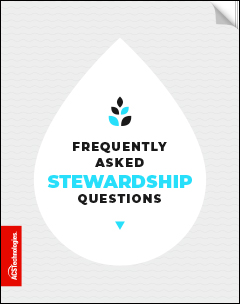Pastors and ministry leaders often struggle with the fundraising expectations of their role. And let’s be honest, most of us as clergy, church or ministry volunteers aren’t trained to be development professionals.
In this blog series, we answer the most frequently asked questions ministry leaders have about stewardship and fundraising. These are the most common questions I get as I work with churches and ministries.
We’ll continue today with a couple additional “nuts & bolts” of fundraising. As we conclude this series, I’ll provide some pointers for those looking to improve their development program.
FAQ #3: How often should we be sending thank you notes to givers?
Church givers often share with me their disappointment that their gifts are rarely thanked or acknowledged by the pastor or church staff. Unfortunately, we have lots of work to do on this front in making our donors feel their value and their importance in our work. Too often, we’re taking them for granted.
We strongly recommend churches build a plan for thanking donors based on their giving frequency, history and platform. That sounds complicated, but it doesn’t need to be. It can be as straightforward as something like this:
- First-time donor: Donors who make a first-time gift are mailed a personalized letter or handwritten thank you within 48 hours of the gift.
- Regular donor pledge or tithe gifts: Pledge or tithe commitment card are acknowledged with a thank you letter within 48 hours of the pledge commitment. Ongoing gifts on the pledge are acknowledged with a thank you letter with a summary of giving impact quarterly.
- Automatic/recurring donors: Initial recurring, automatic gift commitments are acknowledged with a thank you letter within 48 hours. Ongoing gifts are acknowledged with a thank you letter with a summary of giving impact quarterly.
- One-time donations/special gifts: Additional gifts are always acknowledged with a thank you letter or phone call.
- All donors: receive an annual summary of giving for receipting purposes with a thank you and statement of giving impact.
Capital campaigns or special project gifts will trigger other types of thank yous and acknowledgments.
This is just a sample of the kind of process your church could consider. If you don’t already have structures in place to trigger donor thank yous. And there is nothing more valuable to a donor than a handwritten thank you from the pastor. Or even an occasional call/phone message that is simply a thank you, with no other agenda.
FAQ #4: How important is an online giving option? Most of our givers still send checks.
While you may always have givers who want to mail or drop a physical check in the offering plate, many donors find it easier to set up a recurring weekly or monthly donation. This secure, automatic process is easier and less work for the donor. And it’s a more consistent, reliable stream of donation revenue for the church.
Ministries whose donors are giving through an automatic recurring giving platform have a stronger stewardship program. Those donors often give more, and more frequently, than those who chose to give one-time gifts via check or mail. The time and cost savings for both the church and the donor can be significant. Look for ways to outline the benefits of moving tithes and pledges to an automatic monthly or recurring giving platform in your regular communications and also in your annual stewardship campaign materials. But once you do, don’t put your acknowledgments on auto-pilot: be sure you’re thanking your recurring donors often.
In the next blog of this series, we’ll explore the additional FAQs. And pointers for ministries seeking to improve their donor relationships.
Answers to Frequently Asked Stewardship Questions
Fundraising is part art and part science…and it can feel intimidating for pastors and ministry leaders suddenly charged with donor development.
This guide provides answers to the six most commonly asked questions about stewardship – from the pastor’s role in making an ask of a donor to how frequently we should be asking givers for support.
Tim Smith has over 30 years of experience in Church, Non-Profit Administration, Management, and Fund Development. Serving as an Executive Pastor and Chief Development Officer in growing Churches and Non-Profit Organizations has provided a wide range of expertise and resources. Tim serves as Founder and CEO for Non-Profit DNA. A boutique firm committed to helping nonprofits and churches build their capacity through fundraising, leadership, team building, staff recruiting, and coaching.





